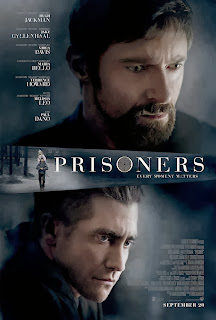Keller Dover (Hugh Jackman), attends a Thanksgiving dinner with his family at the house of their neighbors, the Birches. After dinner, the families' young daughters, Anna Dover and Joy Birch, go missing. After a police hunt, an RV that had been parked in the neighborhood is found outside a gas station next to a wooded area. When Detective Loki (Jake Gyllenhaal) confronts Alex Jones (Paul Dano), the RV's driver, Jones tries to speed away, but crashes into the trees. Alex is revealed during Detective Loki's interrogation to have the approximate I.Q. of a ten-year-old and is released due to lack of evidence.
Gyllenhaal (Detective Loki) soon finds a rotting corpse in the basement of a convicted pedophile, who tells the cops that he didn’t know the man’s name, but that he was a serial child killer. The corpse has a maze-shaped pendant around its neck, and eventually, maze motifs start popping up in the film, though it takes Gyllenhaal—who apparently has a bad visual memory—an agonizingly long time to connect the two.
Once he does, though, the movie effectively cancels out its themes. Hugh Jackman, the obsessive born-again vigilante, was right all along: Dano really is connected to the crime. (Leo is the culprit.) Torture turns out to be just as effective as police work; in fact, Jackman solves the crime first. The movie’s hints at the moral decay beneath Jackman’s family values—which range from the rotting childhood home where he keeps Dano prisoner to a somewhat heavy-handed close-up of Jackman accidentally crushing his daughter’s doll house while scuffling with his son—turn out to be for naught. The final twist vindicates him, and when Leo describes the crimes as “a war with God,” all of Jackman’s religious self-doubt gets annulled. The global war against Evil is real, and all measures are ultimately justified.
Jackman—who comes close to being the film’s villain, especially once he starts misdirecting Gyllenhaal—ends up a hero. His final descent into a hole in the ground, which echoes of the ending of George Sluizer’s The Vanishing, again briefly hints that his character may be destroyed by hubris; however, the movie’s closing shot cancels that interpretation by all but spelling out a happy ending.




No comments:
Post a Comment